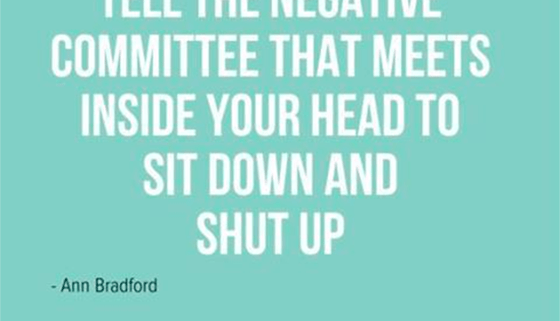Getting Rid of Negative Self-Talk: Words Become Your Experience
While it can sometimes be helpful to criticize yourself, so you can aspire to do better, it can be hard not to cross the self-criticism line into damaging, negative self-talk. There is a huge difference between telling yourself that you need to work on your organization skills, and berating yourself for being the world’s biggest failure because you lost a file at work.
Negative self-talk is not only counterproductive, it also increases your stress levels and can lead to depression over time. Here’s how you can silence the negativity committee in your head, and turn self-directed trash talk into positive motivation.
Use a “box” to put negativity in perspective
If you make a mistake, negative self-talk can inflate that small blunder to world-destroying proportions. Instead of stewing over what happened, take a deep breath and create a mental “box” to put the problem in. Make it as small as possible—in the example above, “I lost a file” should not equate to “I’m an idiot and my career is ruined.” Simply tell yourself you need a better system for organization, so the mistake won’t happen again.
Put a spin on it
In public relations, there are people whose job it is to turn negatives into positives—or neutrals, if positive isn’t possible. You can use something like this to change your thinking with a simple change in semantics. For example, instead of thinking, “I’m so disorganized that I’m never going to get anything done,” learn to say to yourself, “I’m having a thought that I won’t be able to get this done.”
This allows you to focus on the problem at hand, instead of going off on a self-berating tangent and stressing over your organization issues until it’s impossible to move ahead.
Think possible, instead of positive
Everyone knows that positive thinking is supposed to be powerful—but if you’ve ever tried to “think positive,” you may have discovered that you’re one of many people this strategy simply doesn’t work on. In fact, research shows that when you’re discouraged and trying to think positive, you actually feel worse—because your inner lie detector tells you there’s nothing positive going on.
So instead of positive, think “possible.” Focus on what you can actually do to move in a positive direction, even if it doesn’t completely solve the problem. For example, if you’re trying to lose weight, tell yourself “I know how to lose 10 pounds, and I’m going to do it” to banish the “I’m a hideous, jiggly blob” line of thinking.
Be your own best friend
If you told your best friend that you’re disorganized, would he or she gasp in horror and tell you that if you don’t fix that problem right now, you’re going to get fired and end up living in your car?
If you find yourself piling on the negative self-talk, stop and ask yourself what your best friend would say when you mentioned the problem. This also works in reverse: never tell yourself anything you wouldn’t say to your best friend. Treating yourself like a friend helps to cut down negativity and generate more self-confidence.
Embrace your flaws
Flawless people are boring—and they don’t exist. Nobody is perfect. Look to any hugely successful person in any profession, and you won’t find a perfectionist. You’ll find someone who recognizes that they’re a flawed human being, but focuses on their strengths.
Trying to achieve perfection in everything will only lead to frustration, and an inability to finish anything because it’s not “perfect.” So understand your flaws, accept them, and spend way more time understanding your strengths and looking for ways to capitalize on your uniqueness. You’ll soon find that negative voice in your head doesn’t have much to say.


